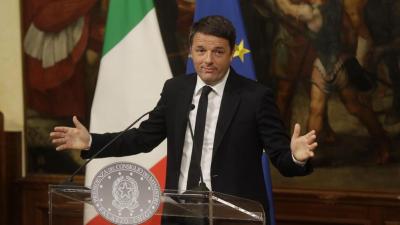What went wrong for Renzi and what happens now?

ROME – As Matteo Renzi shall resign from his position as Prime Minister later on Monday following a huge defeat in the constitutional referendum, many look towards the not so distant future of the Italian government, speculating the possibility of a ‘technical government’ headed by Finance Minister Pier Carlo Padoan, as word also spreads that Renzi may step down as Secretary of his left-wing Democratic party.
The ‘No’ vote won by 59.7 percent against 40.3 percent for ‘Yes,’ with a turnout of nearly 70 percent. In the wake of such a clear victory for the opposition, as only the three regions of Tuscany, Emilia Romagna and Trentino Alto Adige voted for his reform, Italian daily Corriere della Sera claims Mr. Renzi may step down from his Secretary role in the Democratic party too.
The newspaper also speculates whether a ‘technical government’ headed by Pier Carlo Padoan could be a potential solution, whilst the country is depending on President Sergio Mattarella to solve the “deep crisis” it currently faces, despite staunch ‘No' campaigner Silvio Berlusconi claiming, “a technical government is out of the question.”
Minister Padoan is in Brussels Monday to discuss the Italian budget and shall aim to “reassure his European friends,” says La Repubblica newspaper, conscious that the “result of the Italian referendum has brought along a new level of uncertainty and destabilisation to the European Union” and acutely aware of the potential for the entire Eurozone to crumble.
In fact, Italian representative at NATO, Ambassador Stefano Stefanini, told La Stampa, “Rome will now worry about the post-Renzi era, while Brussels will worry about Italy (…) 2017 will be the year of the challenges posed by populism. Italy goes back to being part of the problem now, not the solution.”
Despite a crushing defeat for ‘Yes’ on Italian soil, Il Messaggero says Italians abroad voted largely in favour of Renzi’s controversial proposal. In terms of further priorities, crucial upcoming events include the budget bill, G7 and the Treaty of Rome celebrations.
Over to the triumphant opposition, ex-Prime Minister Berlusconi says he is ready to work towards a large coalition government and calls to change the Italicum (the Italian electoral law), according to La Repubblica. Clearly content with Renzi’s defeat, he also claimed that the moving of a decisive five percent of the electorate was thanks to his handiwork.
Lega Nord leader Matteo Salvini has also been reported by numerous papers to have asked for immediate elections, claiming he “stands ready to lead a victorious alternative,” just as Beppe Grillo’s radical Five Star Movement consider the election result a win for their party. The choice of their Prime Minister candidate begins, as La Repubblica reports Vice President of the Chamber of Deputies Luigi Di Maio to be the best placed.
And now the time has arrived to ponder where it all went wrong for the youngest Prime Minister in Italian history, a man so certain that he would win and hence so deeply moved when he announced he would resign.
In his speech early Monday morning, Matteo Renzi took all the blame himself, stating, “I take full responsibility for the Yes defeat and I say to my friends that I myself lost, not you.”
Indeed, Corriere della Sera reported, “Renzi’s mistakes include remaining by himself against all -- from the moment he announced the reforms his team gradually abandoned him, and to call a plebiscite was imprudent." Respected politician Luciano Violante said to the paper, “Renzi paid the price for an excessive personalisation of the campaign.”
Political commentator Massimo Franco summed up the turbulent event that was the constitutional referendum, saying, “What this shows is that democracy is still alive and that the Italian people are still deeply tied to the Constitution. The attempt to strengthen a non-elected government through a consultation on a referendum turned out to be a gamble.”
It was indeed a gamble, proving not to pay off for Matteo Renzi and his party.
sw


